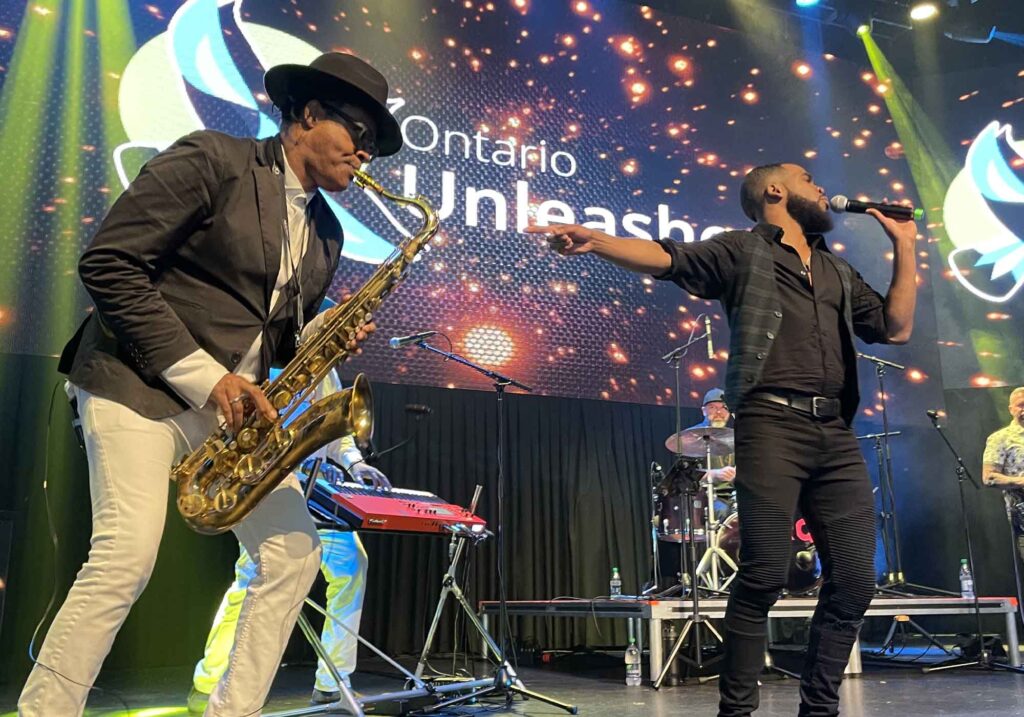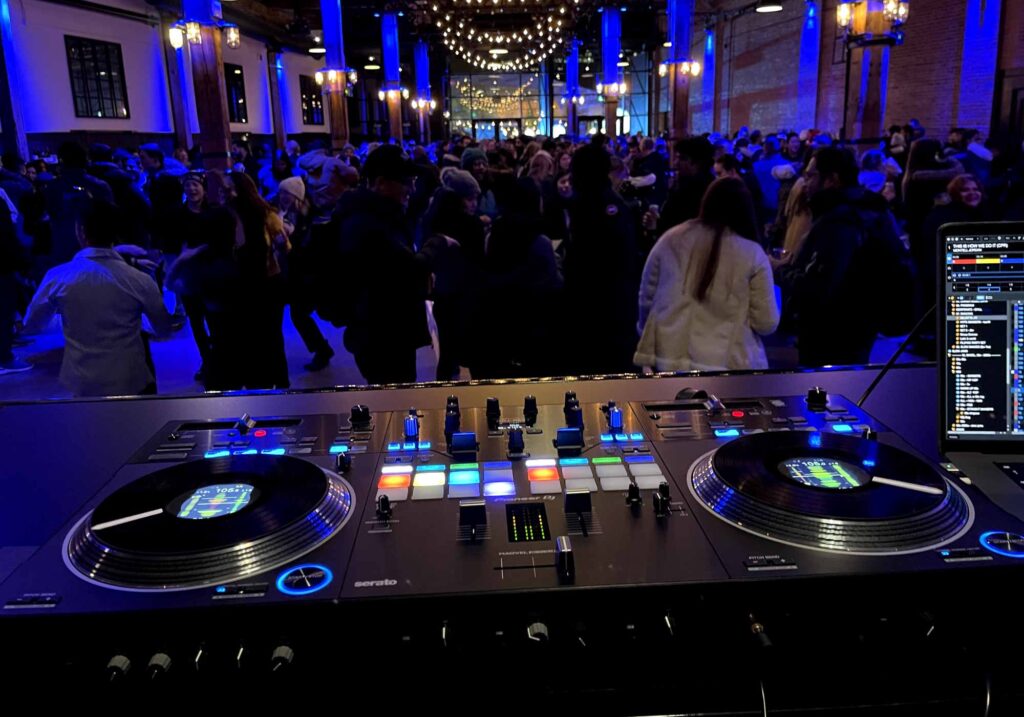Music is an essential component of any corporate event, whether it’s a product launch, networking session, or company party. The challenge lies in choosing the right type of entertainment to set the perfect mood. Most often the selection is made between a DJ or a live band, or maybe a mix. In this article, we’ll analyze key factors and what each option brings to the table. We’ll also explore how they suit various event types to help you create the perfect atmosphere for your occasion.
1. Setting the Tone: Energy and Engagement
The first thing to think about is the mood you wish to set. Live bands and DJs may both establish the mood, but they do so very differently.
- DJs: When it comes to establishing the mood of an event, DJs are quite adaptable. They can seamlessly go from soft background music for cocktail hour to upbeat dancing music for the late hours of the night. They can match the enthusiasm of the event at every moment thanks to their ability to switch between genres and styles, making sure the atmosphere flows with the event. This versatility, however, can sometimes make a DJ feel a bit less personal compared to live performances. Additionally, while DJs can maintain consistent energy throughout the event without needing breaks, their connection with the audience is often more indirect. Skilled DJs can read the room and adjust the tempo or genre to keep guests engaged, but the interaction is mostly based on observing the crowd rather than direct communication.
- Live Bands: In contrast, a live band infuses the occasion with a more genuine and intimate vibe. Live vocals and instruments have a unique quality that can make the event feel more immersive. Bands also engage with the audience in a more personal way, often through speech, body language, and direct interaction, making the experience feel more interactive. The trade-off is that live bands need breaks between sets, which can interrupt the event’s flow, but these pauses can be balanced by thoughtful event planning.

2. Budget and Venue Requirements
Choosing between a DJ and a live band for your event depends heavily on your budget, practical restrictions, and the space available at your venue.
- DJ: DJs are usually less expensive and easier to manage in terms of setup. With fewer participants and less equipment required — typically just a booth and a sound system — this simplifies both logistics and costs. DJs are ideal for corporate gatherings hosted in more intimate settings like boardrooms, lounges, or networking areas. They can easily fit into small locations, requiring minimal space, and still create a great atmosphere without overwhelming the venue. For example, if your business event is a cocktail reception or a team-building exercise in a smaller office or rooftop environment, a DJ is a good option.
- Live Band: Live bands tend to be more expensive due to the number of musicians, instruments, and sound equipment involved. The logistical complexity is higher, requiring more time and space for soundcheck and setup. Smaller venues may not be able to accommodate their performance, as bands typically need a stage or platform, as well as room for instruments and sound systems. However, for larger corporate events — such as business galas, annual conferences, or awards ceremonies in ballrooms or convention centres — a live band can better elevate the atmosphere. Their live performance fills the space with energy and provides a more interactive experience, making them ideal for events that call for a more engaging and vibrant ambiance.
3. Music Variety and Customization
The decision between a live band and a DJ may depend on the varied musical tastes of your visitors, as well as the level of customization you seek for your event.

- DJ: One benefit of hiring a DJ is the ability to meet last-minute requests. Because they can accommodate a range of preferences, DJs are perfect for business parties with a diverse guest list. They can easily adjust to the tastes of a wide range of audiences since they have access to a vast repertoire of music spanning different genres and eras. This adaptability is especially helpful for business gatherings when it’s important to create a lively environment that draws a diverse range of guests. DJs can also create custom mixes that align with your event’s theme or concept, though the degree of personalization relies on the DJ’s ability and taste.
- Live Band: Bands add energy to corporate events with their interaction and charisma. Given enough time, they can learn specific songs important to the event, like a team anthem, in addition to performing well-known covers. A band may create a special mood with their live energy and knowledge in a particular genre for business events that seek a more tailored, engaging experience. However, they often work with a preset setlist, limiting on-the-spot requests. Live bands are excellent for formal events like galas but less adaptable in real-time.
Choosing the Best Option by Event Type and Audience Preferences
Which entertainment choice is ideal for your audience and the sort of event will mostly depend on those factors.
- Formal Events: A live band could be the best option for more elegant and sophisticated business events like award ceremonies, gala dinners, or executive dinners. Jazz, classical, or other sophisticated genre-focused bands may improve the ambiance of the event by bringing in a sense of exclusivity and elegance. Additionally, adding to the feeling of occasion and leaving a lasting effect on guests is the live performance of musicians.
- Casual Corporate Parties: A DJ can set the mood for a laid-back event while still knowing when to stir things up. This is perfect for informal get-togethers like workplace celebrations, holiday parties, or team-building exercises. DJs are skilled at blending several genres so that everyone, from your junior interns to your top executives, will have something to like. They are also perfect for laid-back gatherings that are meant to intensify into more exuberant festivities due to their ability to seamlessly transition between genres.
- Mixed Audiences: DJs are excellent at flitting between styles and genres if your corporate event is attended by a wide range of people with different musical interests, as is the case with sizable company-wide events. They can read the room and adjust the playlist to fit the tastes and age range of the audience, making sure the music is enjoyed by as many people as possible. Because of this, DJs are especially useful for occasions like product debuts and corporate anniversaries when you want to maintain a positive and welcoming atmosphere.
- Networking Events/Conferences: For conferences, trade exhibitions, or networking events, a live band may offer a relaxing backdrop, helping create an atmosphere where guests can engage in talks without being overwhelmed by the music. A DJ could be more appropriate for after-parties or networking mixers, as he or she can progressively turn up the volume while letting guests unwind and take in the social aspects of the occasion.
Combo: DJ and Live Band
An increasing number of event coordinators are choosing to combine live band performances with a DJ to have the best of both worlds. This hybrid strategy guarantees both the flexibility of a DJ and the unique touch of live music.
Benefits of a Band and DJ Combo:
- A live band can perform during formal segments like dinner or speeches, providing a dynamic yet professional atmosphere.
- For the after-party, the DJ may take over and play nonstop, energetic dance tunes.
This combination of live entertainment for corporate events maximizes the advantages of both options, ensuring that guests remain engaged and entertained throughout the occasion.
The tone, budget, location, and tastes of your audience will all play a role in your decision about a live band, DJ, or both for your business event. Live bands give an intimate, participatory experience; DJs offer stability and flexibility. Combining the two might be the ideal answer for people who desire the best of both worlds. Make the greatest decision that will make an impression on your visitors long after your event by taking into account its unique requirements.
